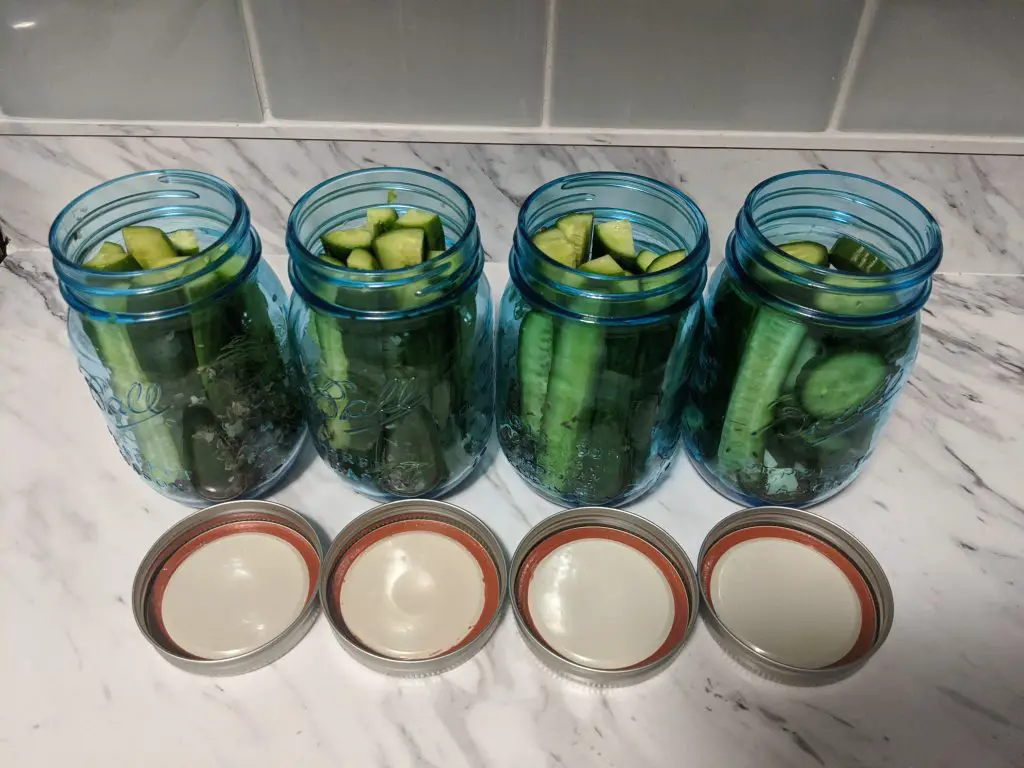While making pickles, safely is important, but proper storage is also something to consider. Even though salt and vinegar, commonly used ingredients in pickle brine, are used as preservatives, there is still a shelf life for each type of pickling method.
How Long Can You Store Pickles? Pickle storage lengths can range 2 months up 1 year. The length of time varies by what type of pickling method, fermented and non-fermented, and what container is used. In all cases, pickles should be stored in a dark place and not in direct sunlight. Regardless of the length of time by method, if your pickles ever become slimy, smell bad, or lose their firmness, throw them away.
| Type of Pickle | Max Storage Recommendation | Storage Vessel | Storage Environment |
|---|---|---|---|
| Refrigerator Pickles | 2 Months | Mason Jar | Refrigerator |
| Fully Fermented Pickles | 4 – 6 Months | Mason Jar | Transferred to refrigerator after fermentation |
| Canned Refrigerator Pickles | 1 Year Sealed and 2 Months After Seal Broken | Mason Jar | Seal Unbroken – Cool and dark environment. After Seal Broken – Transferred to refrigerator and replace jar lid with new one. |
| Canned Fermented Pickles | 1 Year Sealed and 2 Months After Seal Broken | Mason Jar | Seal Unbroken – Cool and dark environment. After Seal Broken – Transferred to refrigerator and replace jar lid with new one. |
There are many factors that go into a long storage life for pickles. In addition to the pickling method and type of container, other factors such as refrigeration play an important role.
Refrigerator Pickles
Refrigerator pickles, or “fridge pickles” that are homemade can last for two months in the jar given they are kept refrigerated. Depending on the ingredients you use, like peppers, the flavor may also become more intense the longer they are stored.
There are many different recipes for refrigerator pickles that call for varying amounts of vinegar and salt, but their intent is not to create a salt brine for fermentation purposes. Because of this, it is not advisable to leave them out of a refrigerated environment even though salt and vinegar are used as preservatives. In terms of storage length, leaving pickles out of the refrigerator will also cause them to go softer quicker, and no one likes a soft pickle.
For commercially available pickles that are not fermented, such as Claussen, you will see brands sold both in the refrigerated and non-refrigerated section of your local supermarket. Take note of the expiration date printed on the jar in this case, but that only applies until it is opened, or the seal is “popped”.
In terms of making pickles in away that they would be safe to store, the U.S. Food and Drug Administration partnered with the ARS Food Science Research Unit in North Carolina, one that works full time on processing commercial pickles, to research methods to avoid safe methods to prepare and store.
Through a major partnership with the pickle industry, guidelines to reach 99.999 percent reduction in bacterial pathogens were found. The findings were that pasteurizing at 1.2 minutes in a brine with a pH level of 4.1 was the sweet spot. This would ensure that pickles purchased at the store would be safe while stored at home.
While these may be able to sit out overnight, they will go bad much quicker left out of the refrigerator. As a best practice, if you are uncertain, do not roll the dice with food safety.

Fermented Pickles
When making fermented pickles, they can be stored in the original container for four to six months in a refrigerated environment. Most people use a mason jar to make and store the pickles. The fermentation process is not stopped, but only slowed down, while pickles are stored in the fridge. This means that even thought you have a long window on storage, the flavor my change over time as the pickles continue to ferment.
Fermented pickles were traditionally created in barrels, but these would keep fermenting past the half sour stage into full sour which may be too intense for some people. When using a barrel, ensuring they stay submerged was also critical to ensure they are safe to eat. Fermenting in a barrel is a more advanced method of fermenting and requires more attention and caution than using a mason jar on your counter top. Please only use safe and tested recipes when using a traditional barrel method.
Canned Pickles
Originally invented as a way to preserve food for military use, the idea of canning food has been around since the 1800s. The mason jars that are most commonly used today were patented by Alexander H. Kerr in the year 1915.
Canning pickles is the longest storage method. The downside of this is it will kill all the probiotics in your pickles. This is also a benefit as it is what affords such a long storage window. With canning, you will be able to store your pickles for a year. Canned pickles will also not need to be refrigerated, but you must keep them in a cool dark place.
Once the seal is broken on your canned pickles, meaning you “pop” the lid, they must be refrigerated and the year long storage window no longer applies and standard refrigerator pickle storage methods should apply. Once you break the seal on your canned jar lid, replace the lid with a new one as the seal is not reusable after it is used for canning and will not be airtight. You may use the same jar and sealing ring though.
No matter the type of pickle you enjoy, storing them for the appropriate length of time and adhering to proper safety guidelines is the most important take away. For further reading on pickle safety and storage methods, the U.S. Department of Agriculture and National Center for Home Food Preservation have good information on storing pickles. Over the years, improved proper storage methods and guidelines resulted in less spoilage and less waste for the pickle manufacturers. Because this lead to the cost of pickles coming down, they are included with sandwiches as a standard garnish in most places.
